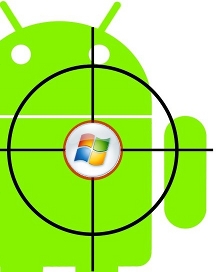Target - Android
 One of the signs that a product has become successful is a lineup of competitors trying to sue you. Based on this criterion, the Android project has become a truly major player in the field of mobile systems.
One of the signs that a product has become successful is a lineup of competitors trying to sue you. Based on this criterion, the Android project has become a truly major player in the field of mobile systems.Recently, in the tops hangs the news that Microsoft has filed a lawsuit against Barnes & Noble (a large American network of bookstores). According to Microsoft, the Nook e-book, which uses Android as its operating system, violates five Microsoft software patents. And of course it will not be a surprise that these patents cover trivial “innovations”. Here is a brief overview of what Microsoft believes violates the Nook:
# 5778372 : “Remote search and display of electronic document management with embedded images.” What is described here is to show the document on top of the background image. The idea is that the document is displayed while the image has not yet been transferred entirely. When the image is received - the document is redrawn again.
# 5889522 : “Child window control system.” This patent covers the application setup dialog with tabs.
# 6339780 : “Status of loading pages in a browser with a limited scope.” This patent covers the idea of “loading” images during page loading (such as images of a rotating ball in IE browser).
# 6891551 : "Managing the selection frame when editing electronic documents." Covers the idea of adding small images around the selection frame, so the user can use Drag'n'Drop to change the selection area.
# 6957233 : “Method and device for capturing and displaying annotations to unmodifiable electronic content” —a method of storing “annotations” outside the document. Roughly speaking this patent covers bookmarks in browsers and books. I bet this idea was “invented” long before Microsoft registered it in 1999.
')
It seems unlikely that Microsoft could win at least one of these patent claims through the courts. On the other hand, knowing the level of technical literacy of judges in the field of patent legislation should not miss such an opportunity. In the real world, patent litigation costs a lot of money, time and nerves. And Barnes & Noble apparently was chosen because it looks like a weak target that would be easy to “punish”. However, this company refused to offer Microsoft to license the above patents. So the next step is the trial.
Perhaps soon we will see a solid counter-attack from other companies; there are hardly many supporters of the idea of licensing the right to use bookmarks from Microsoft. It is even possible that the entire US mobile market will simply collapse under the weight of the steadily growing avalanche of patent lawsuits.
Patent lawsuits are not the only way to attack Android. There is also a broad FUD company to discredit the project and the developer community. Most recently, it was claimed that Android violates the licensing conditions of the Linux kernel. It is worth noting that one of the active lawyers accused represents Microsoft , although this fact was recently removed from his online biography.
The goal of these attacks is clear as day is to instill fear, insecurity, and doubt (FUD) in the growing Android ecosystem. Equipment vendors have been notified that they may well be sued for using Android. Software vendors have been told that writing an Android application may entail copyright infringement claims from Microsoft and other companies. Such actions, in the opinion of their authors, can force companies to reconsider investments in favor of “safer” alternatives.
The fact is that we have seen this kind of FUD campaign before. Back in the 1990s, people were assured that using Linux could lead to companies "losing their intellectual property." Fortunately, most companies have found that these threats are not true. So when we see ridiculous statements like:
If Google is wrong, then the entire software stack — as well as many popular third-party, closed-source components, such as Angry Birds and Adobe Flash Player — will be forced to publish their code under the GPL license.
we can relax knowing that we have seen similar tricks before. Linux has proven to be remarkably resistant to FUD; and this discrediting company is unlikely to slow things down.
It is worth noting, despite recent claims that a company from Android developers could be sued by free software developers, in fact, a lawsuit was filed from a company that is hostile to the idea of free software. . There is a threat to the developers, but it does not come from the open-source community. The threat comes from companies that feel that they are losing the market from under their feet, and instead of conquering users with a high-quality low-cost product, they are trying to use the court for a showdown with competitors. Nevertheless, this course of events is one of the hallmarks of the success of Android, and our community is flattered by this.
This article is a translation of Target: Android .
Source: https://habr.com/ru/post/116259/
All Articles